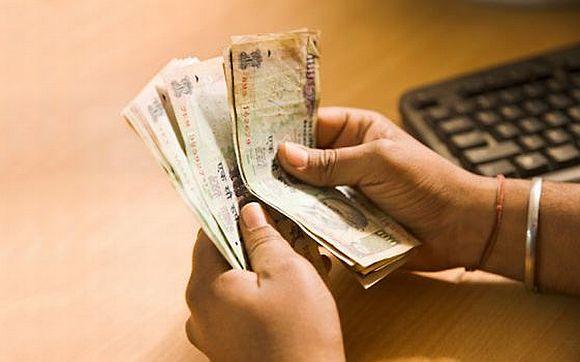The government of India's funding to the tune of hundred of crores to non government organizations is a huge scam, the Asian Centre for Human Rights has alleged.
In its report titled 'India's Funds to NGOs Squandered', the ACHR says: 'The selection of grantees (NGOs to whom government funds are allocated) is often determined not on ability or technical expertise but rather on the applicant's ability to pay a bribe.'
'NGOs allegedly had to pay bribes amounting to 15 per cent to 30 per cent of the grant to have their projects approved. If a conservative estimate of 15 per cent is used as a bribe to process the applications, during the fiscal years 2002-2003 to 2008-2009 at least Rs 1000 crore have been spent on bribes to different layers of officials approving the projects.'
As per the replies by central and state governments to RTI pleas filed by ACHR, over Rs 6654.36 crore as grants to NGOs/voluntary organisations during 2002-2003 to 2008-2009 or an average of over Rs 950 crore every year. This includes over Rs 4756 crore given by the central Government and Rs 1,897 crore by the state governments.
...
Indian NGO funding is a multi-crore scam: ACHR
According to ACHR Director Suhas Chakma, "The figure of Rs 6654.36 crore of funds given to NGOs is only indicative and not accurate."
He added, "Firstly, a number of states and Union Territories such as Madhya Pradesh, Uttar Pradesh, Orissa, Jammu and Kashmir, Arunachal Pradesh, Mizoram, Dadra and Nagar Haveli, Daman and Diu and Lakswadeep failed to provide information about the grants given to NGOs. Second, many departments of the state governments and UTs which replied did not provide full information. Third, the central government ministries provided much less figures under the RTI applications in comparison to information placed before the Parliament (both Lok Sabha and Rajya Sabha). Fourth, little information was made available with respect to many flagship programmes, including Mahatma Gandhi National Rural Employment Guarantee Act. Fifth, many of the government owned Public Sector Undertakings did not provide information about the funds given to the NGOs as part of the Corporate Social Responsibility and therefore, not included in this study."
With regard to ACHR's allegation on kickbacks paid by NGOs/VAs to receive funds, Chakma stated: "The estimate of Rs 1,000 crore in bribes must be seen in the context of the Comptroller and Auditor General's Report No.17 of 2010-2011 pertaining to audit of transactions and performance in the Ministry of Environment and Forest in which the CAG concluded that 7,916 Utilisation certificates (UCs) from the grantees for grants worth Rs 596.79 crore from 1981-2009 were not obtained under the scheme of Grants-in-Aid to Voluntary Agencies."
"The CAG concluded that the possibility of misutilisation/fraud is not ruled out as majority of VAs/state forest departments /forest development associations neither came back to the National Afforestation and Eco-Development Board for the next instalment after release of first instalment nor did they furnish UCs/progress reports"
...
Indian NGO funding is a multi-crore scam: ACHR
The ACHR report also highlighted the lack of accountability in the system.
It noted that the Council for Advancement of People's Action and Rural Technology sanctioned 24,760 projects during September 1, 1986 to February 28, 2007 involving a total sanctioned grant of over Rs 252 crore. Out of these, 511 NGOs were placed under the blacklist category due to irregularities committed.
However, out of 511 blacklisted agencies/NGOs only 10 cases were referred to the Central Bureau of Investigation for investigation while the First Information Reports were lodged against only 101 NGOs. By August 3, 2009, the number of NGOs blacklisted by the CAPART increased to 830 and FIRs were lodged against 129 blacklisted NGOs. By May 3, 2012, another 81 NGOs were placed under Black List category and 195 NGOs were placed under Further Assistance Stopped category by the CAPART.
To address the malaise, the ACHR has recommended the establishment of a 'National Grants-in-Aid Commission' through which all grants to the voluntary sector by all the ministries shall be routed. It will be responsible for selection of proposals, monitoring of implementation, review of reports and recovery of funds.
In the interim period, ACHR has requested the Centre to direct (i) all ministries to do away with the current process of recommendations by district magistrates and the state governments, invite applications through open call for proposals, consider applications on merits by independent evaluators, and conduct necessary verification only after short-listing of the applicants; and (ii) direct all central ministries, state governments and UTs to make all information pertaining to grants to the voluntary sector, including recommendations of the state government publicly available as part of the voluntarily disclosure under the Right to Information Act, 2005.




article